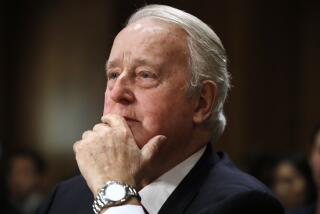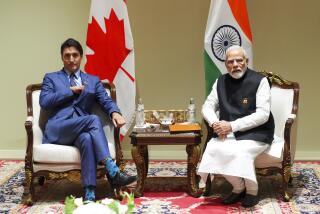Canada Turns Down ‘Star Wars’ Program Role
- Share via
OTTAWA — Canada on Saturday formally turned down President Reagan’s invitation to take part in his “Star Wars” space defense research program, deciding that it is not in the Canadian national interest.
However, Prime Minister Brian Mulroney told reporters that his government nevertheless supports the U.S. effort to explore the feasibility of a space-based defense system as “prudent in the light of significant advances in Soviet” nuclear armament.
Moreover, Mulroney, who made the announcement after two days of consultations with his Cabinet and the ruling Progressive Conservative Party caucus in Parliament, said that Canadian scientists and private high-tech industries are free to take part in the American project.
Has Praise for Program
While turning down Reagan’s March 26 invitation on the surface, Mulroney nevertheless spoke highly of the U.S. Strategic Defense Initiative, the formal name for Reagan’s five-year, $26-billion program to determine the feasibility of a space-based defense against nuclear attack.
“Only a 6-year-old child” would be naive enough to think that the Soviet nuclear arsenal doesn’t present a threat, the prime minister said.
Mulroney’s action followed a recommendation made last month by a special parliamentary committee that Canada should maintain some distance from the U.S. program.
It also was a display of the prime minister’s tendency to fence-straddle on controversial issues in an attempt to cut the ground from under his critics while not quite rejecting programs that he had previously supported.
In this case, he tried to avoid charges by the two opposition parties and influential sectors of the nation’s academic and cultural community that it would compromise Canada’s traditional stance as a mediator between the superpowers if this country should join what they describe as a potentially destabilizing and dangerous acceleration of the nuclear arms race.
This tactic was evident from a statement by Mulroney on Saturday--that accepting Reagan’s invitation would run against Canadian national interest by getting this country “into an area where the parameters are beyond our control.”
At the same time, however, Mulroney hopes to bolster the country’s lagging high-tech industry by allowing it to bid on “Star Wars” contracts. According to his aides, the prime minister anticipates that this would also create badly needed jobs for scientists who might otherwise be tempted to leave Canada for better opportunities in the United States.
Cover Up Embarrassment
And by publicly backing Reagan’s concept, Mulroney expects to cover up any embarrassement to the President that might arise from having his presumed closest ally turn him down on a favorite project.
This was particularly important to the United States, diplomatic sources here said, because only Israel has accepted the Reagan invitation. Even such strong allies as Britain and West Germany have hedged their responses.
The prime minister said that he informed Reagan of his decision Saturday. He would not characterize Reagan’s response, but he did say that “I don’t think there will be any disappointment in the White House.”
Other Canadian officials said that because nearly all Canadian scientists and high-tech engineers work in universities and private firms and will be allowed to take part in “Star Wars,” Mulroney is providing just about all the expertise the Americans would have received if the prime minister had linked his government formally to the research program.
Whether Mulroney’s strategy will accomplish his purposes is not known, although diplomats say privately that the prime minister’s stance will not seriously offend the United States.
“As long as he did not shoot at the program and publicly recognized the validity of Reagan’s approach, the (American) Administration will accept Mulroney’s decision,” one diplomat said.
But acceptance by Mulroney’s critics may not be so easy, and his position is unlikely to be accepted by the Soviet Union as the proper role to be played by a potential mediator.
In fact, a senior Soviet official told the Toronto Globe and Mail that Mulroney’s stand leaves Canada as morally responsible as the United States for “Star Wars,” which the Soviets denounce as an escalation of the arms race.
Public Reaction Important
More important to Mulroney will be the public reaction, as influenced by the expected negative reaction from his parliamentary and academic opposition, although he asserts that public opinion polls show nearly 60% of Canadians support “Star Wars” research.
Canadians generally are quite proud of the claim that their country has a unique ability to be a peacemaker, even though it is an ally of the United States, and they have supported past governments’ efforts to promote disarmament.
Also, there is a continuing concern by some Canadians about what they see as the danger of being drawn so closely into the American orbit on defense matters that the country will lose its freedom to operate independently.
More to Read
Sign up for Essential California
The most important California stories and recommendations in your inbox every morning.
You may occasionally receive promotional content from the Los Angeles Times.













